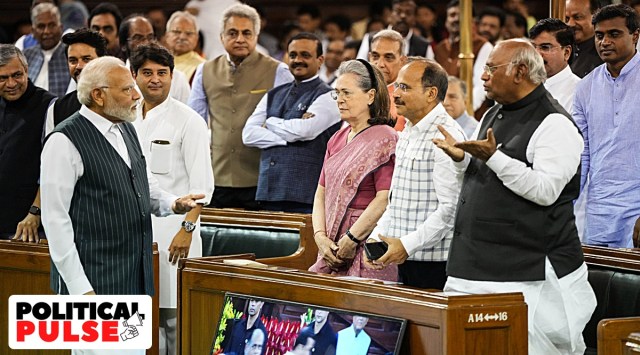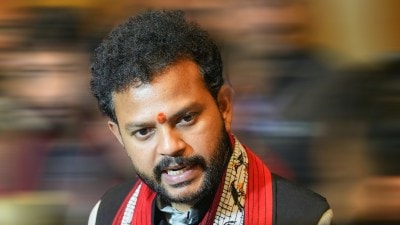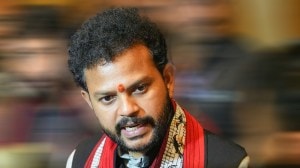Opposition finds common ground on Women’s Reservation Bill pushback, demands OBC quota
Congress failed to push Bill through in 2010 over quota-within-quota demand but now aligned with other INDIA parties on the issue, Sonia may open for party in Lok Sabha debate on Wednesday.
 Congress president and Leader of the Opposition in Rajya Sabha Mallikarjun Kharge set the stage to demand reservation for OBCs during his speech on Tuesday. (PTI)
Congress president and Leader of the Opposition in Rajya Sabha Mallikarjun Kharge set the stage to demand reservation for OBCs during his speech on Tuesday. (PTI) As the Women’s Reservation Bill was introduced in the Lok Sabha on Tuesday, the Opposition found two talking points to attack the government. The parties said the Bill was a “huge betrayal” of the hopes of women as the implementation date had been kept vague and criticised the government for not providing quota for backward classes.
The Congress marked a complete turnaround from its position in 2010 when it failed to push the Bill through in the Lok Sabha — it was approved by the Rajya Sabha — because of stiff opposition from the Samajwadi Party (SP) and the Rashtriya Janata Dal (RJD) over their demand for quota within quota for Other Backward Classes (OBCs) and minorities. On Tuesday, as parties belonging to the INDIA alliance heaved a collective sigh of relief on finding points to criticise in the Bill, the Congress demanded reservation for OBCs. The demand is in sync with the larger Opposition bloc’s caste census demand and the social justice rhetoric could become one of the potent weapons in the Opposition’s arsenal for 2024.
While most parties, including the Congress, will not oppose the Bill, the Opposition is set to demand reservation for OBCs during the discussion on the Bill in Parliament. Sources said Cong Parliamentary Party chairperson Sonia Gandhi was likely to participate in the Bill discussion in the Lok Sabha on Wednesday and could even be the party’s lead speaker.
Congress president and Leader of the Opposition in the Rajya Sabha Mallikarjun Kharge set the stage for the OBC quota demand during his speech in the House on Tuesday. “Backward classes ko isme thodi si aage peeche hone ka sambhav isliye hai ki unless Constitutional amendment one-third backward ko dene ka nahi hota … toh naturally, wahan ke mahilao ko nahin milta. Agar aap nahi karenge toh sirf un backward classes ko anyay hoga (The backward classes may suffer in this because unless the Constitutional amendment provides one-third quota to the OBCs, their women will not benefit from it. If you don’t do that, it will amount to injustice to the backward classes),” Kharge said in the presence of Prime Minister Narendra Modi.
Explaining his opposition to the Bill, Congress leader and former Union Finance Minister P Chidambaram wrote on X, “The date of the next Census is indeterminate. The date of the next Delimitation is indeterminate (and perhaps controversial). The Women’s Reservation is dependent on two indeterminate dates. Can there be a greater jumla? The women’s reservation can be implemented immediately on the basis of the updated Voters lists.”
Senior Congress leader K C Venugopal said, “At the earliest, this will kick in for the 2029 elections. If it isn’t applicable immediately, this is just another headline management stunt by the Modi government. Further, the Bill doesn’t account for reservation for women from OBC communities. Without that, it is incomplete in its social justice agenda. The government should ensure that along with women’s reservation, representation of India’s backward communities is also guaranteed.”
Congress communications chief Jairam Ramesh labelled the Bill a “jumla”. He said, “In a season of election jumlas, this one is the biggest of them all. A huge betrayal of the hopes of crores of Indian women and girls. The Bill … says the reservation will come into effect only after the publication of the next census and the subsequent delimitation exercise thereafter. Will the Census and delimitation be done before the 2024 elections? Basically, the Bill gets the headlines today with a very vague promise of its implementation date. This is nothing but EVM — EVent Management.”
He added, “If the PM had any real intention to prioritise women empowerment, the women’s reservation bill would have been implemented immediately without the ifs and buts and all other conditions. For him and the BJP, this is only an election jumla that delivers nothing concrete.”
Some of the Opposition parties said they would bring amendments proposing reservation for OBCs. The CPI(M) and the Aam Aadmi Party (AAP) criticised the government while parties such as the Rashtriya Janata Dal (RJD), Samajwadi Party (SP), and Bahujan Samaj Party (BSP) reiterated their demand for quota within quota for OBCs and minorities. Senior CPI(M) leader Brinda Karat said the Bill only ensures women are going to be deprived till the next Census and delimitation exercise. “In the 2024 elections, we will not have one-third in Parliament and in many of the state Assemblies,” she said.
Delhi minister and AAP leader Atishi said a closer reading of the provisions of the Bill shows that it is a “mahila bewakoof banao (fool women) Bill”. “Why have the provisions of delimitation and Census been included? This means that women’s reservation won’t be implemented ahead of the 2024 Lok Sabha polls. We demand that the provisions of delimitation and Census be done away with and the women’s reservation be implemented for the 2024 Lok Sabha polls,” she said.
Senior RJD leader Manoj K Jha said his party had been a strong votary of quota within quota. “And what is interesting is that it is not clear when the reservation will kick in. It is just a post-dated commitment by a government which has lost its prestige. It is laughable,” he said.
BSP chief Mayawati said her party would not support the Bill if women from SC, ST, and OBC communities were not brought under its ambit. “In the context of this Bill — I have said this in Parliament multiple times — our party wants women to get reservation in Parliament and state Assemblies. Instead of giving 33% reservation if 50% reservation is given to women based on their population, then we will welcome that too. The government should consider this. Along with this, I have also said that if women are given reservation, then women belonging to Scheduled Castes, Scheduled Tribes, and OBC category should be given reservation,” Mayawati said.
She added, “This reservation should not be included in the already existing reservation for SC and ST categories in the Lok Sabha and Vidhan Sabhas. The reservation granted to SC and ST categories in the Lok Sabha should be kept as it is. Now, the 33% being granted (to women), there should be an arrangement to give them reservation from that. Otherwise, it will be unfair to people from these categories.”
SP president Akhilesh Yadav said reservation for women should strike a balance of gender justice and social justice and demanded clarity on the share of the backward, Dalits, minorities, and tribals in the seats set aside. “Women’s reservation should be a balance of gender justice and social justice. In this, reservation for backward, Dalit, minority, tribal women should be clear in definite percentage form,” he said in a post on X.
- 01
- 02
- 03
- 04
- 05































